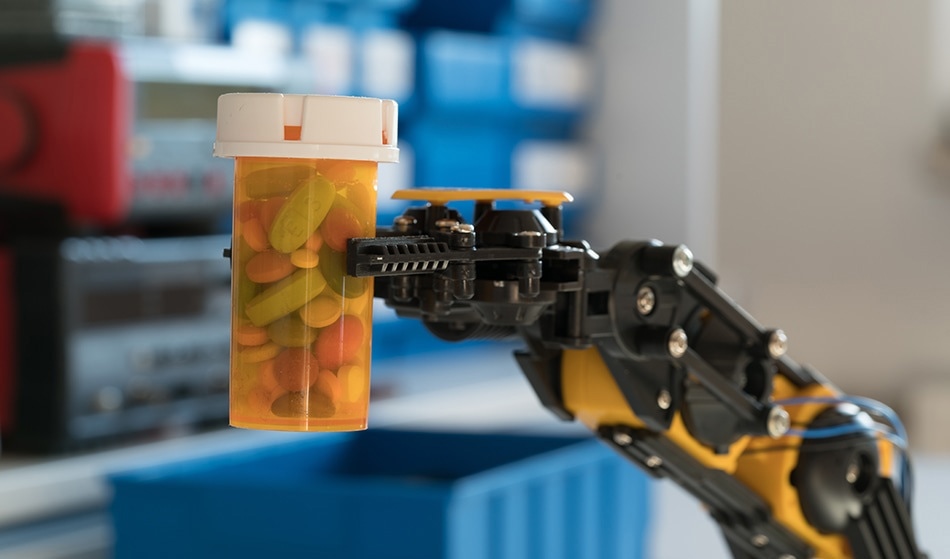
Image Credits: science photo/shutterstock.com
Pharmacy robots have been present in US and continental European hospitals since the mid-1970s, but the UK hospital network has traditionally had a mixed dispensing profile. This is in part due to the way NHS Trusts (now CCGs – Community Care Groups) operated around the UK.
The original pack dispensing robot used in the US and Europe has been difficult to implement in the UK. However, since NHS CCGs have come under the purview of NHS England, pharmacy robots have become commonplace, with clinicians and pharmacists largely in favor of universal implementation.
The Robot Pharmacists
ARX System
Due to insurance-based healthcare models driving the need for efficiency, the technology UK hospitals use originated in the US and Europe. UK hospitals have trailed different robots but the most common ones operate on a similar basis. The Norfolk and Norwich University Hospital still uses the ARX system dubbed ‘FRED’ by hospital staff (Friendly Robotic Electronic Dispenser). FRED was developed by the-then St Albans based company before it was taken over by European giant Becton Dickinson (BD) in 2016. FRED was the first automated dispensing system to have four robot arms working side-by-side. Capable of holding 40,000+ drugs, FRED retrieves orders from scripts entered into its computers by clinicians. Labels are generated by the same computers before FRED delivers the medication by chute directly to the dispenser’s desk. FRED supplies both the hospital pharmacy as well as a top-up service to wards and, with a 100% accuracy record, has become part of the team at NNUH.
The ARX/Rowe Vmax 160 system
The ARX Vmax system is a similar pharmacy robot with enhancements allowing the robotic arms to retrieve 8 packets of drugs at once; an increase compared to the earlier models. In 2015, South Tees NHS CCG installed a Vmax robot in their pharmacy. Clinicians were impressed and reported that the robot was able to label and dispense a drug in seven seconds or less. With quieter self-cleaning systems and reduced size, the Vmax has represented a huge step in convincing other UK hospitals to update their pharmacies and install automated robots. The Vmax was later installed at the Leicester Royal Infirmary in 2016 and has been running with an excellent record. The robot has also been installed at Worthing hospital with Western Sussex Hospitals NHS CCG looking to acquire more in the future.
Pilltime
Originated by pharmacist Paul Mayberry, Pilltime has become the latest robotic innovation in dispending medication. Designed to speed up medication rounds on wards, Pilltime is a fully functioning automated dispensary first trailed in early 2019. Instead of nurses manually sorting medication for each patient before rounds begin, scripts are entered by tablet straight into the Pilltime system. Using an optical checker, the robot collates the different medications a single patient requires before dispensing it into individual sealed pouches, arranging them in the order the medication needs to be taken. Each pouch is then labelled with the patient’s name, date and time that the medication needs to be taken. Thanks to the optical check and simple human verification, errors have been reduced and nurses on the original trial at Salford Royal NHS Foundation Trust reported a time saving of 30-40 minutes per round. The overall average time saved once the trial was complete stood at 87 minutes a day. Since the trial, Pilltime has been rolled out to the Heartly Green Immediate Care Unit at the same hospital.
Future Benefits to UK Hospitals
Smart dispensing robots are delivering increased accuracy and speed, freeing up pharmacists to offer advice to patients and allowing nurses to deliver higher quality care. UK Healthcare has been slow at adopting new technology compared to other sectors, but with demands on GPs, nurses and pharmacists increasing, the desire for robots to help ease the load has never been higher.
Sources and Further Reading
Disclaimer: The views expressed here are those of the author expressed in their private capacity and do not necessarily represent the views of AZoM.com Limited T/A AZoNetwork the owner and operator of this website. This disclaimer forms part of the Terms and conditions of use of this website.